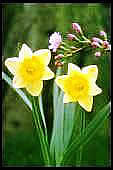 St Mary's Church, Dymock
St Mary's Church, Dymock
| Admin | |||
| . | Home | Contents | |
| H&S Policy | People Safety | Grave Yard | |
The Church & The World
Faith & Care
Faith & Care
Things Past
People & Features
People & Features
Seasons and Festivals

As well as the Seasons and Major Festivals which help us worship God, the church celebrates several 'Special Days' throughout the year to remember, honour and support each other and our work in God's world. Celebration of the "Special Days" is usually optional, Christians chose which they want to remember, not all churches celebrate all these days....
'Special Days'
| January | Plough Sunday | July | Sea Sunday |
| February | Education Sunday | August | |
| March | Mothering Sunday | September | Racial Justice Sunday Harvest Festival |
| April | Rogation | October | Disability Sunday Animal Welfare Sunday Hospital Sunday |
| May | Christian Aid Week | November | All Saints Day, All Souls Day Remembrance Sunday |
| June | Fathers Day Reader Sunday |
December | Nine Lessons and Carols Christingle Service |

The work officially began on the following Monday, but the teams would usually drag the plough around the village, seeking contributions for an 'Ale' or night of revelling at the tavern. Tuesday was then spent in recovering from the hangover, so the work wouldn't actually begin until the Wednesday!
Times have changed. No longer do we, in England at least, still use village ploughs, and winter-sown cereals mean that few farmers, if any, start their ploughing in January but do it in the autumn instead. The festival had fallen into disuse, especially with the more recent emphasis on celebrating several weeks of Epiphany.
In many places it has been revived as an optional 'minor festival' on a later Sunday in January. In blessing the plough we remember that God is interested not just in our worship on Sunday but in all we do, including our work during the week, too, and it gives us the opportunity to pray for the farms and farmers of our parish, for our country and for our nation. And, of course, for those who farm in the hungry lands of our world, and those who harvest the seas for fish. (Return to top)
Ann Cam School,
Dymock
Education Sunday, as the name implies, is a national day of prayer on the ninth Sunday before Easter to focus on the world of education and has been celebrated as a 'Special Day' for well over a hundred years.

Other churches put off the celebration in order that they can hold a special service at another time, such as the beginning or end of their local school's term, its Awards Day, or the beginning or end of the academic year. (Return to top)

.
By the 17th and 18th centuries, it had become common for young serving maids and boy apprentices to be given a holiday to visit their 'Mother Church' - they had probably left home as young as 10 years old and that was often their only holiday all year and the church expected you to go back and visit your 'Mother Church' on that day - that is, the church where you were baptised. As your parents probably still lived near that church, you'd go and see them too, so children were reunited for one day with their mother, so the day popularly became known as 'Mothering Sunday'.
(Return to Top)

.
As young girls and boys no longer go into domestic service away from home at such a young age, when this day is celebrated in church today, we in England seem to have adopted the American name 'Mother's Day'.... and buy a bunch of flowers to give our mother as a gift instead of making them, but we still celebrate the church itself and God, the mother and father of us all, as well as praying for and thanking our mothers for all they do for us.
(Return to Top)